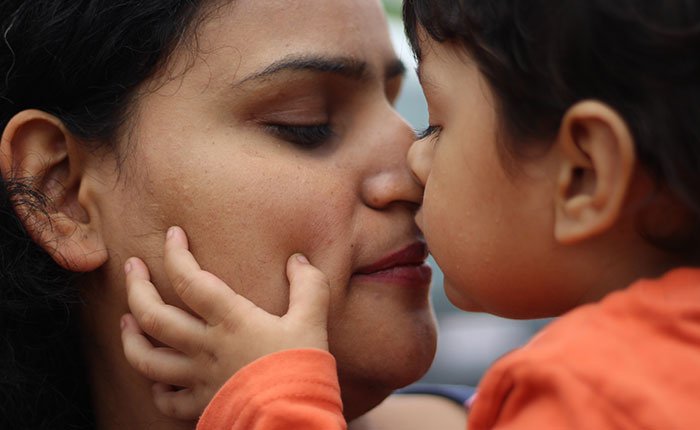What can be done to prevent FASD?
Prevention of FASD is a national priority area in the Australian Government’s National Fetal Alcohol Spectrum Disorder Strategic Action Plan 2018-2028.19

This strategy highlights the need to focus on partners, families, and broader social norms around alcohol in Australia instead of presenting FASD as a women’sissue. The Plan includes two Prevention Objectives:
- reduce access to and consumption of alcohol in the Australian community
- increase community knowledge and awareness about the harms and consequences of drinking during pregnancy or when planning a pregnancy.19
The following section provides a brief overview of what healthcare providers, communities, families, partners and friends can do to prevent FASD.
What support can healthcare providers offer?
Healthcare providers play a critical role in having conversations with women during pregnancy about alcohol use. There are several ways that they can do this. These include providing accurate and timely information and universal screening.
Provide accurate and timely information
There is growing awareness in the community that abstinence is the safest option during pregnancy.20 However, as mentioned above, some research indicates that up to 50% of Australian pregnancies are unplanned 18, meaning that prenatal alcohol exposure may often occur in the period between a woman becoming pregnant and before the discovery of pregnancy.18
Some women will be at high risk for unplanned pregnancies (sexually active but not using effective contraception) and also drinking alcohol at risky levels. For these women, motivational interviewing could be used by healthcare providers to help them change their drinking patterns.
This could also involve a counselling session about contraception options.21 Combining these conversations can increase awareness of risks associated with drinking while pregnant and contraception options to prevent an unplanned pregnancy.
All women of childbearing age could benefit from being informed about the impact of alcohol in pregnancy. All women should be aware that drinking alcohol in the very early stages of pregnancy, including before they know they’re pregnant, can be harmful. Healthcare providers can provide women of childbearing age with accurate information regarding alcohol consumption during pregnancy.
The most recent version of the Draft Australian Guidelines to Reduce Health Risks from Drinking Alcohol state that:
A. To reduce the risk of harm to their unborn child, women who are pregnant or planning a pregnancy should not drink alcohol.
B. For women who are breastfeeding, not drinking alcohol is safest for their baby.22
The FASD Hub provides useful, up-to-date information on FASD. It also provides training and support for health practitioners. (A link for the FASD Hub is provided at the end of this document.)
The Women Want to Know initiative also provides tools and skills for health professionals who want to provide information about alcohol to women who are planning a pregnancy or are pregnant. (More information is provided at the end of this document.)

Universal screening
Universal screening offers a way for healthcare providers to have conversations with women who are planning to have a baby, are pregnant or breastfeeding.
A recommended universal screening strategy for healthcare providers is to use the ‘Screening, Brief Intervention and Referral to Treatment (SBIRT)’ approach with each woman for each pregnancy. This involves the following:
- screening (ask about alcohol consumption) using a validated screening tool
- provide a brief conversation based on how much a woman drinks
- refer to appropriate support/ treatment if necessary.23
An example of a simple validated screening tool is the AUDIT-C, which focuses on identifying problematic alcohol use through a fast, 3-question survey.
Screening, using tools such as these, provides the healthcare provider with information about the woman’s alcohol consumption. If a woman is identified as being at low risk, health practitioners can provide a brief intervention about alcohol use. This might include education about the effects of alcohol use on the developing fetus and child. If a woman is identified as being at high risk, health practitioners can refer her to support/treatment with an appropriate service.
This approach, provided as part of standard practice received by all pregnant women, can help:
- normalise the process of universal screening
- reduce stigma associated with the topic of drinking during pregnancy
- reduce bias in administration
- help identify trends across time and locations to guide FASD prevention efforts.
Training should be provided to healthcare staff so that they feel comfortable having these conversations.24
Community-led prevention
Community-led prevention is where community members identify a health problem and work towards reducing the impact of that problem through prevention work. The community members may work collaboratively with specific groups like health agencies or community organisations to do this work. An example of community-led prevention is provided below.
An Australian example
The Marulu Strategy is an example of a community initiative to overcome the challenges associated with FASD and early life traumas in the Fitzroy Valley, Western Australia.25
The Marulu Strategy was initiated in 2007. It came about because Aboriginal and Torres Strait Islander community leaders became aware of learning and behavioural difficulties in children in their community.25 Unusual facial features and poor growth were also identified. Community leaders initiated a campaign in partnership with Marninwarntikura and Nindilingarri Cultural Health Services to address the identified problems. That campaign resulted in the development of the Marulu Strategy. Other benefits were also realised, including legal restrictions on the sale of full-strength alcohol, access to diagnostic services, and help and support for families affected by FASD.25 The Strategy focused on prevention by building knowledge and awareness of FASD.26
What can families, friends and partners do to prevent FASD?
‘Pregnant Pause’ is the primary FASD prevention program in Australia.
This program focuses on encouraging pregnant women and their families, friends and partners to stop drinking during the woman’s pregnancy. It focuses on a whole community in the prevention of FASD, rather than just the women.
The overall impact of broad prevention programs like Pregnant Pause is limited. However, there is some evidence to suggest that about a third of Australian women would abstain from drinking if their partner encouraged them to cut back, or if their partner also stopped drinking for the duration of the pregnancy.27
Partners, families and friends of pregnant women can take a pledge to stop drinking while their loved one is pregnant. This reduces the peer pressure a woman might feel to drink (even in small amounts) throughout pregnancy and make her feel less socially alone.
More information for pregnant women and their support networks can be found at Pregnant Pause.